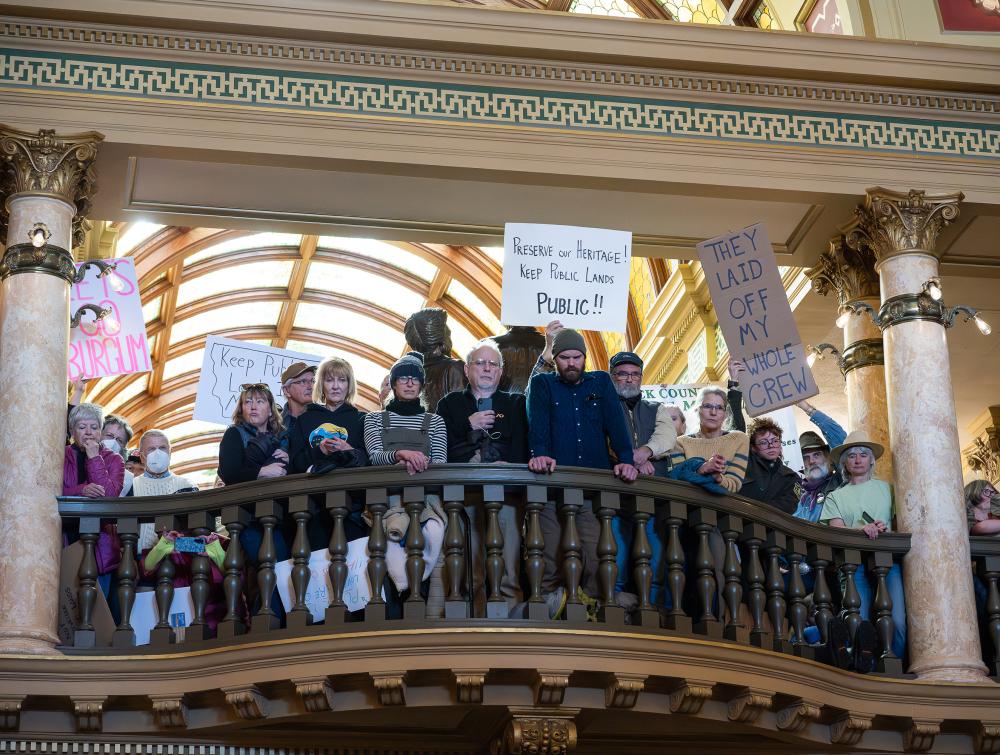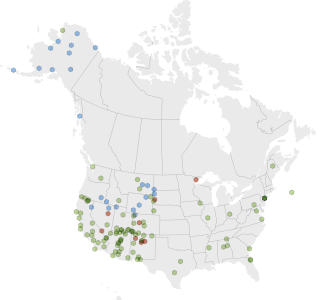Public lands in chaos as mass terminations unleashed

Local citizens protest against terminations and attacks on public lands at a rally in Helena, Montana.
Mason Cummings
Thousands of dedicated civil servants axed en masse
After an executive order issued by President Trump on Feb. 11 promised to unleash “large-scale reductions” in the government workforce, thousands of employees have been or will soon be suddenly and unceremoniously terminated across federal agencies. More than 3,000 people were fired from the Forest Service and 2,000 from the Department of the Interior—and it’s likely just the beginning.
Make no mistake, despite what the administration claims this will not boost “efficiency.” By one analysis, the administration could fire the entire civilian workforce and still run a growing deficit of more than a trillion dollars. This action only sows further chaos and fear. Our hearts are with those thousands of dedicated civil servants like now-former National Park Ranger Brian Gibbs, who was locked out of work at his dream job before even receiving formal notice on Valentine’s Day.
But the total toll of this action has yet to be seen and will be far greater than initial reaction would suggest—and once again, our public lands will suffer.
Terminations ravage already stretched agencies
At agencies like the Forest Service and National Park Service, the terminations will hit like a ton of bricks. Our public lands management agencies are already severely understaffed and underfunded, sitting on years-long work and maintenance backlogs they are unable to address. The problem has only gotten worse as extreme, landscape-devastating natural disasters driven by climate change—like Hurricane Helene and the Los Angeles wildfires—have become more common.
Though a complete accounting of the terminations is still unclear, it won’t be long before the impact of these terminations is felt. In some cases, the effects may be physical and immediate, like excess trash or overflowing toilets in national parks. Already, the National Parks Service is reporting major disruptions, with maintenance staff reportedly slashed to single digits in some cases and Yosemite’s online reservation system paused indefinitely. Indiscriminate firing of rangers will jeopardize public safety.
But the long-term impacts may be even more broad. Cuts at the Forest Service totaling approximately 10% of all staff—along with a federal hiring freeze that is blockading new firefighters—will hurt routine maintenance that helps prevent severe wildfires. Cuts at the Bureau of Land Management will stall the permitting process that all projects on public lands must pass through—ironically stalling project reviews despite these claims of “efficiency.” Much like the butterfly effect of chaos theory, which holds that small incidents like the flapping of a butterfly’s wings can ripple over time into massive impacts like a tornado, the scale and severity of the ramifications could be gargantuan.
Is this government efficiency?
Despite the explicit claim made by the administration that this action is about “maximizing efficiency and productivity,” it stretches the imagination to think this act was about government efficiency—even the most basic logic dictates that thousands of immediate, indiscriminate terminations couldn’t possibly boost “efficiency.” In one instance, the Natural Resource Conservation Service terminated an employee it had just spent $20,000 relocating. And now, government agencies are already scrambling to rehire critical employees who were terminated in the blitz.
This act was about sending a message. The Trump administration wants people like you and me who care about public lands—and a functional government—to shrink away in fear or become so lost in the labyrinth of chaos that we are unable to fight back.
Thankfully some members of Congress have stood up against these attacks. Last week, Senator Bennet (D-CO) introduced an amendment to the budget bill to reinstate these employees immediately. Unfortunately, but unsurprisingly, it was voted down by the Republican majority—with the notable exception of Senator Murkowski (R-AK).
The Wilderness Society is not going anywhere. We’ve stood strong for 90 years, and with your support, we will continue to stand strong even in the face of such momentous obstacles.



